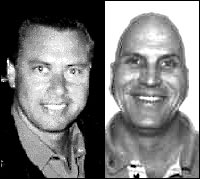A BIT OF FIST SHAKING, an exchange of insults, heated accusations of financial transgressions and rigged votes. It’s hand-to-hand union politics, and it winds down this week with balloting to decide who will lead powerful Seattle Teamsters Local 174. The election is being refereed by federal officials and pits the autocratic spirit of Dave Beck against the union’s democratic reform movement. “I don’t hold out much hope for our future,” says former 174 boss Bob Hasegawa, “unless membership really rises up against the machine.”
Machine and corruption are among the hot-button issues, along with health and welfare benefits, that the 7,150 rank-and-file members will sort through as they vote by mail over the next couple of weeks. The truck drivers work for dozens of companies, including Boeing, UPS, Pacific Coca-Cola Bottling, and Waste Management, and they haul everything, including industrial materials, beer, heating oil, and newspapers. In choosing a leader, they’ll decide if they want to return to modern reforms or stick with some of the traditions of old-school Teamsters like Beck, the late Seattle labor leader who never graduated from high school but went on to become president of the International Brotherhood of Teamsters (IBT) in the late 1950s (and wound up in prison in the early 1960s for union corruption). “Why should truck drivers and bottle washers be allowed to make decisions affecting policy?” he used to ask. “No corporation would allow it.”
That hard line has returned with international president James P. Hoffa, son of disappeared former Teamsters head Jimmy Hoffa. Promising a stronger top-down leadership, the son took over the 1.4 million member union in 1999, driving out reformer Ron Carey after nine years of liberal change. In 2001, Hoffa retained his job by outpolling 2-to-1 Portland reformist Tom Leedham, who was heavily supported by Local 174 here.
THE SEATTLE election is a microcosm of the international’s battles, matching old guard incumbent Scott Sullivan with reform challenger Dan Scott for secretary-treasurer of 174, the state’s second-largest Teamsters unit. And just as the Justice Department continues to monitor the international, under a 1989 consent degree (resulting from U.S. claims that the IBT had struck a “devil’s pact” with the mob), the Department of Labor has stepped in to count and verify the votes of Local 174. Sullivan took office in 2000 after edging reform leader Hasegawa by a mere two out of the 3,000 votes cast. Hasegawa insisted some of his supporters’ ballots weren’t counted and claimed the outcome was rigged. He eventually persuaded Labor Secretary Elaine Chao to challenge the vote with a federal lawsuit. The outcome, unreported until now, was a quiet agreement in January to let the U.S. take control of the 2003 election.
Hasegawa has opted not to run this time because of a time-consuming eligibility dispute. “So rather than sidetrack the whole election,” he says, “I decided to appoint another person to run in my place.” That’s Scott, a longtime Hasegawa backer and 174 board member who, Hasegawa says, has a decent chance to win now, with the feds checking off the votes.
Incumbent Sullivan says he has no problems with the feds counting ballots. “After they took our depositions [for the lawsuit], they offered oversight as a compromise,” he says. “Frankly, we would have settled for their oversight right off the bat, when they brought the lawsuit.” Sullivan says he proposed the 2000 election be held with federal oversight but that Hasegawa opposed it. “If we’d done it then, we wouldn’t have this issue now.”
THOUGH BACKED BY Hoffa, Sullivan says he’s adopted some of the reforms instituted by Hasegawa, who was elected on a progressive platform in 1991 and led the local for nine years. “We reached out to people who opposed us in our last election,” says Sullivan, a Teamster for 27 years, “and they currently support us. We didn’t fire Bob’s staff, and some currently work for me, while Bob cleaned househe fired all the business agents in 1997, and the institutional memory of the union got changed overnight. We chose not to go down that road.”
Traditional Seattle Teamsters from Beck through the late Arnie Weinmeister have been players on a national scale. But Seattle reformers have also been at the head of their movement. Hasegawa, who once called the Teamsters magazine “a piece of shit” because it had all those photos of Hoffa in it, was considered one of the country’s top reform leaders. Reformer Dave Reynolds heads up Local 763, having knocked off long-reigning Hoffa ally Jon Rabine in 2000although Reynolds has fired and alienated some of his former liberal followers. At the 2001 union convention in Las Vegas, it was Seattle Teamster Charles Alexander who stood up and proposed that Hoffa stick to the promise he made, then broke, to cap international leadership salaries at $150,000. Alexander, of the Teamsters for a Democratic Union, also fearlessly told the Hoffa-heavy convention crowd, “A bunch of goons have been standing at the mike and keeping us from speaking.” An official then turned off the microphone altogether.
HASEGAWA SAYS, “The lesson to be learned from Hoffa’s tactics is that, in my case, it’s OK to steal an election, because there’s no downside. His guy is put in power regardless.” His designated stand-in has targeted Sullivan’s spending habits in the wake of a 25 percent unionwide dues increase. Both Scott and Hasegawa say the general-fund balance under Sullivan tumbled from $250,000 to just $47,000 while travel expenses tripled. To replenish the funds, Sullivan borrowed from the strike pool of freight Local 741, which recently merged with 174. Scott says that might violate bylaws. In a letter to Sullivan, Scott accused him of “scheming” and “contempt for the will of the members that I find appalling.” If that wasn’t clear enough, he added: “Your actions are crudely disingenuous.”
Sullivan says he’s simply succeeding where Hasegawa failed. “They called themselves reformers, but they weren’t about reform. To me, leadership is about doing the right thing for all the members.”








